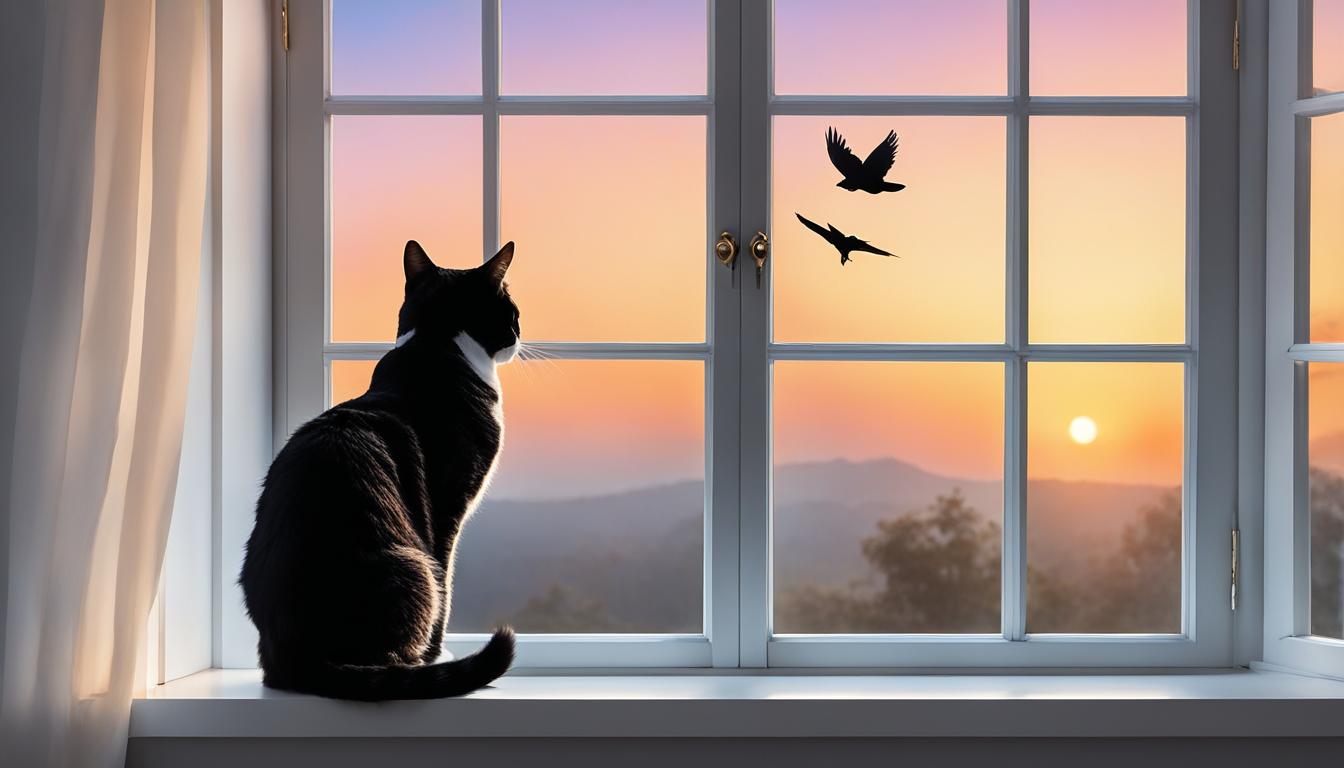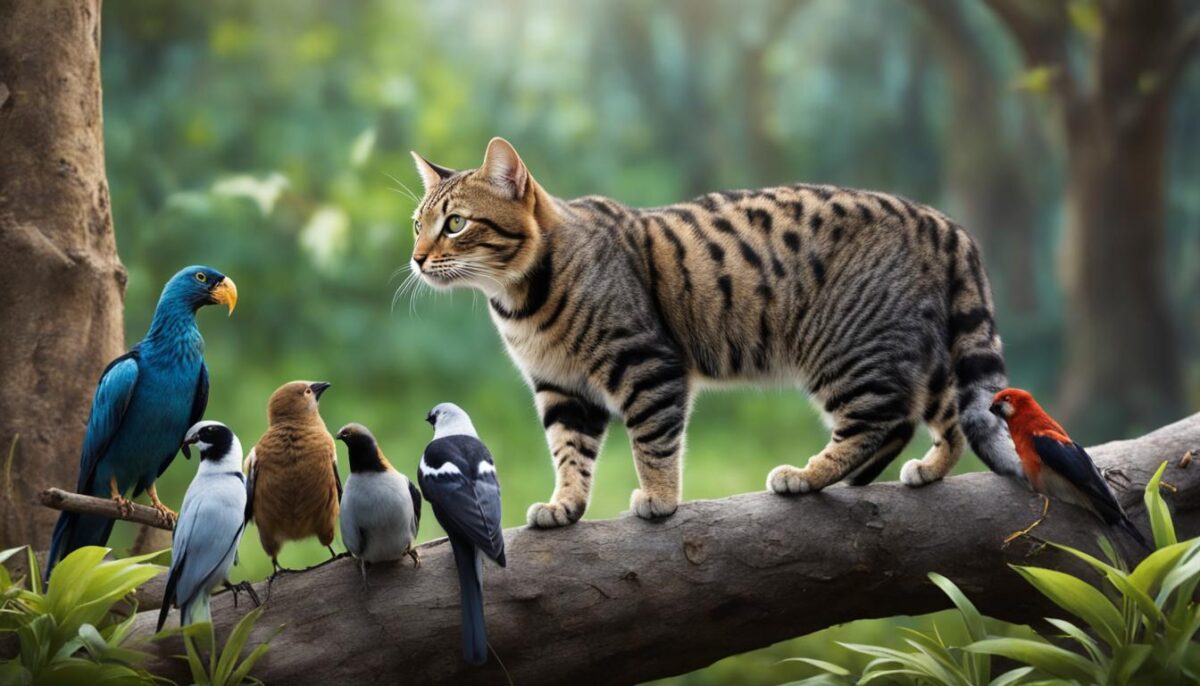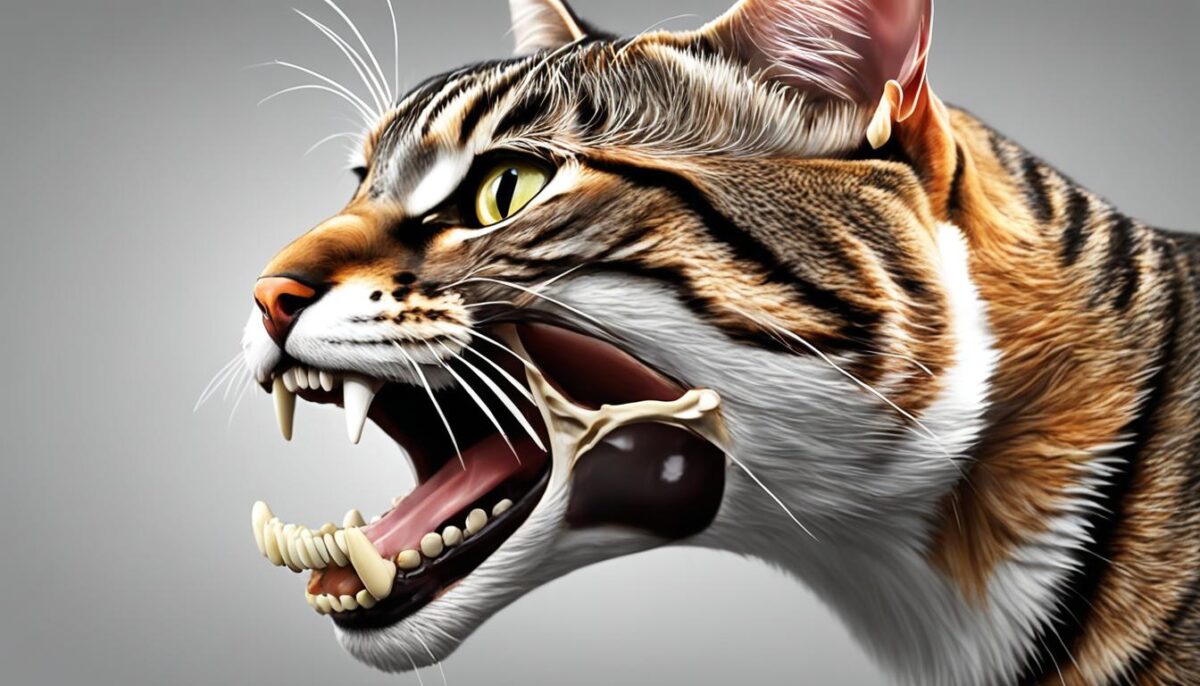Have you ever watched your furry friend sit at the window, eyes locked on a bird, and start making odd, clicky sounds? This funny noise is what we call “chattering,” and it’s a normal part of cat language. Cats do this when they see something they really want but can’t get to—like a bird outside. They might feel both happy to see the bird and sad because they can’t catch it. This mix of feelings comes out in mysterious cat sounds. Don’t worry; your cat is just talking in their own way!
Key Takeaways
- Cats chatter when they spot birds or other things they want to catch.
- This sound is a special part of how cats talk, called feline behavior.
- Chattering shows a cat’s mixed feelings—excited yet frustrated.
- Understanding cat communication helps us know what they feel.
- Watching and listening to a cat can teach us a lot about them.
Unveiling the Reasons Behind Your Cat’s Chatter
Have you ever heard your cat make a funny, chattery sound? Cats do this for a few cat chatter reasons. Sometimes it is because they see a bird and they can’t catch it, which makes them feel frustrated. The sound your cat makes is part of their wild feline vocalizations. Let’s explore some reasons why they might be telling us something with these sounds.
- If your cat is hungry or wants a snack, you might hear them chatter. They are asking you for food!
- A cat might chatter to get your attention. They could want to play or just hang out with you.
- Sometimes, if something is bothering them like a dirty litter box, they’ll tell you by making noise.
However, chattering isn’t just about what they want right now. It can also tell us if our furry friend is not feeling well.
| What Your Cat Feels | Possible Reasons They Chatter |
|---|---|
| Stressed | New people or animals in the house |
| Not Well | They might have health problems like a sore tooth or tummy |
| Old and Confused | Older cats can get mixed up and that might make them talk more |
Cat behavior insights help us understand these amazing animals better. When you know what your cat’s chatter might mean, you can help them feel happier. So the next time your cat starts talking in their special way, think about what they might be trying to say!
Exploring the Role of Instinct in Feline Communication
Have you ever seen your cat sitting by the window, tail twitching, eyes locked on a bird outside? Suddenly, your furry friend starts making a funny noise, kind of like chattering. This noise is totally normal and pretty cool—it’s part of a cat’s natural instincts. Cats have been doing this for a long, long time, even big, wild cats like lions and tigers!
The Hunting Connection: Is Chattering a Predatory Behavior?
When cats chatter, they might be thinking about hunting. It’s like they’re practicing the big moment when they pounce and catch their toy—or in wild cats’ cases, their dinner! Their bodies are amazing; they can stay super still and focused, but their mouths go all chatter-chatter as they watch birds or squirrels. This sort of cat predatory behavior is a big clue into what goes on inside a kitty’s curious mind.
The Sound of Frustration: When Prey Remains Out of Reach
Sometimes, though, chattering might show that a cat is a tad frustrated. Imagine wanting a cookie on a high shelf you just can’t reach—uh-oh, right? That’s how cats feel when they see something they want to chase but can’t. These prey-driven chattering sounds are a giveaway that cats have strong feelings just like we do. By listening, you can understand your cat’s emotional expression a whole lot better.
Isn’t it neat to think about all the ways cats talk, even when they can’t use words? It’s like they’re telling us a secret story—if we pay attention, we can learn what they’re feeling and thinking.
Why Do Cats Chatter When They See Birds?
Have you ever noticed your furry friend chattering while staring out the window at birds? Cats do this cute yet curious little teeth-chattering movement when they spot a birdy friend. Some people think cats chatter because they’re excited or planning how to catch the bird. They may also be trying to copy the bird sounds. Isn’t that smart?
When cats chatter, some believe they are practicing their amazing hunting skills. It’s like when you play pretend and imagine doing something really cool. Chattering in cats might be their own way of doing just that!
Bird watching cats might also chatter because they’re a little frustrated they can’t go out and play with the bird. If you’ve ever really wanted to do something but couldn’t, you know how that feels!
Let’s think about why predatory cat chatter happens with the help of a table:
| Reason for Chattering | What It Might Mean |
|---|---|
| Excitement | Your cat is super excited to see a bird and can’t help but make noise. |
| Mimicry | Maybe your cat is trying to talk like a bird to say hello or trick the bird! |
| Frustration | The chattering could be because your cat wants to go outside but knows they can’t. |
| Practice | It’s like your cat is rehearsing a play, practicing to be the best hunter! |
Chattering is part of what makes cats so special and interesting. Next time your cat starts chattering, pay attention. You might learn something new about what they’re thinking or feeling!
The Science Behind the Chatter: Cats’ Unique Vocalizations
Have you ever watched a cat as it stares at birds outside the window? Suddenly, it makes a funny noise that sounds like a mix of purrs and clicks. That’s what we call chatter, and it’s a sound that’s full of secrets. Let’s dig into the science that makes your cat chatter. It’s a mix of special body tools – like its jaw – and its smart brain that still remembers being a wild hunter.
Anatomical Insights: How a Cat’s Jaw Contributes to Chattering
A cat’s mouth is not just for meowing or eating. The way a cat’s jaw is built, and its cat jaw anatomy, helps it make that chattering sound. When cats see birds, they open and close their mouth super fast, which could be copying how they bite their prey. This could also show how focused and excited they are, even if they’re just watching and not actually hunting.
Cognitive Responses: Excitement and Anticipation in Cats
But it’s not just about body parts. Cats have a brain that tells them a bird is a snack, even if they never hunt for food. This is feline cognitive behavior. When cats get super excited about seeing a bird, their chattering is like saying, “I’m ready to hunt!” It’s how they show they’re anticipating the hunt. Even though they’re safe in your home, cats still think about chasing after birds, just like their big cat cousins in the wild.
| What the Cat Does | What’s Happening Inside |
|---|---|
| Rapid Jaw Movements | Chatter anatomical causes: Jaw mimics biting motion |
| Intense Gaze at Prey | Feline cognitive behavior: Deep focus on a bird |
| Chattering Sound Emitted | Feline vocalization science: Excitement turns into sound |
| Body Stiffening | Cat excitement response: Instincts taking over |
Next time your kitty chatters while looking out the window, remember: they’re using amazing body skills and ancient wild cat secrets to talk about their excitement. Whether it’s watching birds or just playing with a toy, your cat is always a little bit of a hunter at heart, and that’s pretty cool!
How Cat Chatter Enhances the Human-Feline Bond
When your cat starts chattering, it might seem like just a cute quirk. But it’s so much more than that! This little noise can show you a whole new side of your fuzzy friend. Interpreting cat chatter isn’t just about the sounds. It’s about getting to know your cat and growing closer together.
Think of chattering as a secret language just between you and your cat. When they chatter, they might feel excited or wanting your attention. That’s a chance for human-feline communication! And by listening, you can make your cat feel heard and loved.
Here’s why paying attention to your cat’s chatters is important for bonding with pet cats:
- Shows you care: When you listen to their little “chat”, you tell your cat you’re interested in what they have to say.
- Builds trust: Responding to their sounds makes your cat trust you more. It’s like you’re saying, “I get you,” and they love that.
- Makes them happy: Cats feel happy when their humans understand them. They’re more likely to snuggle up and be your pal.
So, the next time your kitty starts chattering away, remember it’s more than just noise. It’s a fun way they talk to you and try to tell you things. And who knows, maybe you’ll start having some pretty interesting ‘chats’ with your furry friend!
Conclusion
Have you ever listened to your cat and wondered, “What are they trying to say?” The sounds cats make, especially the chatter, add to their mystery and make us love them even more. While we may not know all the reasons cats chatter, watching and learning from these moments can help us understand our furry friends better. It’s like putting together a puzzle. Each piece of chatter is a clue to what your cat may be feeling or wanting.
Understanding the Mystery Adds to Feline Charm
Each meow, purr, or chatter from your cat is special. These sounds make cats who they are: lovable and mysterious. Decoding cat language might not be easy, but trying to figure it out is part of the fun of having a cat. When you pay attention to their chatter, you show your cats you care about them. This makes them happy and helps them feel loved.
Next Steps: Observing and Responding to Your Cat’s Chatter
When your cat chatters, it’s time to play detective. Watch when and how they chatter. Are they looking out the window at birds? Do they chatter when you’re together? By seeing what they do and giving them what they need, like playtime or a quiet place, you can talk back in your own way. This is part of interactive pet care. Listening and responding to cat chatter brings you and your pet closer. It’s an important part of being best pals with your cat.
FAQ
What is cat chattering and why do cats do it?
Cat chattering is a unique vocalization that often occurs when cats are watching birds and involves a rapid movement of the jaw. Cats may chatter due to a mix of excitement and frustration when they spot prey but can’t reach it. This behavior might also be related to their instinctual hunting habits, where the sound reflects their anticipation of a prospective chase and predatory focus.
Are there specific reasons why cats chatter?
Besides the excitement of spotting prey, cats chatter for various reasons. They may vocalize when hungry, seeking attention, or in distress—possibly due to a dirty litter box. Chattering can indicate health concerns in some cats, such as hyperthyroidism or kidney disease, and might also be a response to stress or environmental changes. In older cats, it could be a sign of cognitive dysfunction.
Does chattering mean my cat wants to hunt?
Chattering could very much be rooted in your cat’s hunting instincts. While observing potential prey, the instinct to hunt may kick in, causing your cat to chatter due to excitement or as a psychological boost for an impending chase. It’s a common behavior seen in both domesticated cats and their wild counterparts, like lions or cheetahs.
Why does my cat chatter when he sees birds outside the window?
The sight of birds can trigger your cat’s chattering because it might be responding to the excitement or anticipation of the hunt. There’s also a theory suggesting that chattering could be a form of mimicry where cats replicate the sounds of their prey. This behavior could help the cat practice their attack strategy or may simply be an expression of frustration at not being able to chase the bird.
Can a cat’s jaw anatomy influence their ability to chatter?
Yes, a cat’s jaw and dental anatomy are thought to contribute to their abilitity to make the chattering sound. The rapid jaw movement could be an involuntary mimic of the biting motion used to deliver a killing blow to prey, or a physical manifestation of intense excitement and focus while watching prey.
How do cognitive responses in cats lead to chattering?
Cognitive responses in cats, involving their brain and nerves, can result in chattering as a reaction to the sight of prey like birds. Even in the absence of a need to hunt for food, the deeply ingrained hunting instincts in cats may still trigger excitement and focused attention, leading to chattering.
Can understanding cat chatter improve my relationship with my cat?
Absolutely. By acknowledging and understanding your cat’s chattering, you can deepen the bond between you two. Recognizing this behavior shows your cat that their communications are heard and valued, which can enhance trust and affection, leading to better care and more enriched interactions.
What does it add to our knowledge about cats when we understand why they chatter?
Delving into the reasons behind cat chatter can demystify some aspects of feline behavior, adding to the charm and fascination we have for these companions. While not all reasons for chattering are clear, this quirky behavior can encourage a greater understanding and appreciation of the complexities within our feline friends.
How can I respond to my cat’s chatter behavior?
Observing when and how your cat chatters is essential. Responding appropriately, by providing toys to simulate hunting or addressing their needs, helps you interpret this vocalization. Engaging with your cat in this way fosters a responsive and caring relationship, which is beneficial for both of you.


